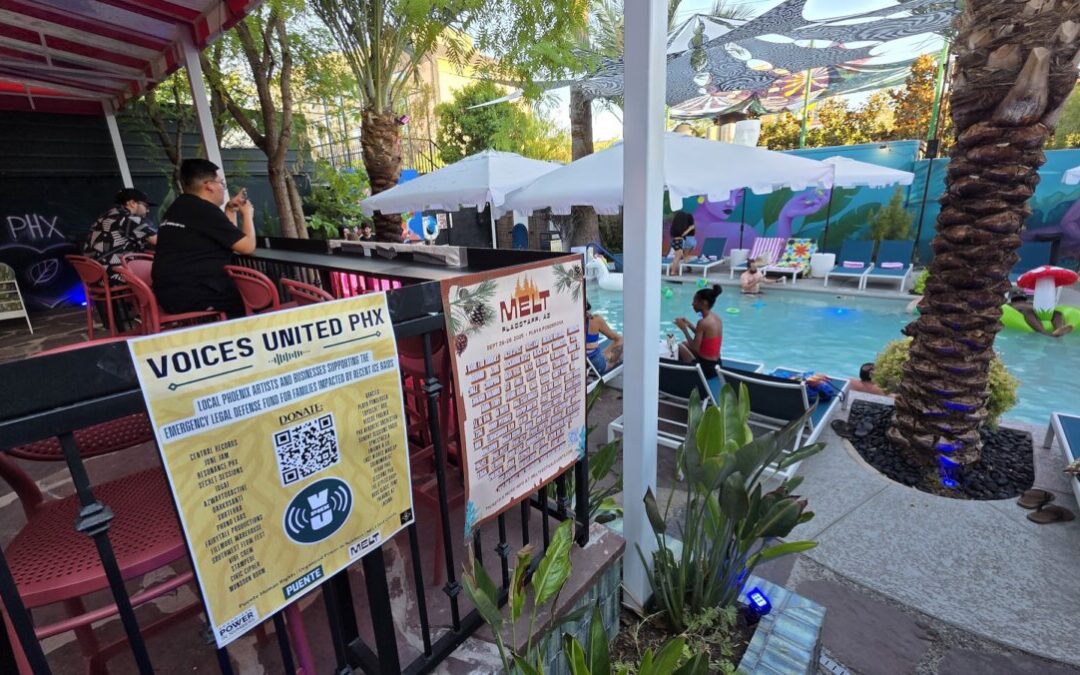
Brandon Gonzalez, who has been living in Arizona since he was a baby, felt he had no choice but to return to Mexico after months of detention and allegedly “degrading” treatment in ICE detention.
In his 25 years of living in Arizona, Brandon Gonzalez always tried to live as a model citizen, knowing that the slightest transgression could expose his undocumented status and potentially rip him away from the only home he’d ever known.
His parents came to the US in 1999 in pursuit of a better life, after struggling to raise a family in Mexico due to low wages. The family settled in downtown Tucson, where Gonzalez was raised and went to school, before he moved to Phoenix in December 2024.
But this year, Gonzalez and his girlfriend, Ivy Bonilla, lived in fear as the Trump administration began to carry out the president’s mass deportation agenda, targeting undocumented immigrants regardless of whether they’d committed a crime.
Bonilla, a US citizen, said they followed all the social media pages that shared Immigration and Customs Enforcement (ICE) activity to ensure Gonzalez could stay away from those locations. It was exhausting for the couple to always be looking over their shoulder, but it was the price they were willing to pay to keep Gonzalez safe.
“He was living in fear all the time, because there’s cops everywhere, there’s ICE at the Hispanic markets across the street from his home,” Bonilla said. “He was just getting really frustrated, always living like that.”
That fear was justified, as the couple learned on July 14. While they were driving in Scottsdale, local police pulled them over for driving on an expired license plate. The car, which was gifted to Gonzalez by a friend, was registered in his friend’s name. When the officers asked for his driver’s license, Gonzalez began to panic, knowing he had nothing to show them to verify his identity, Bonilla said.
In Arizona, undocumented people must prove they have legal status to obtain a driver’s license.
Bonilla said police planned on giving Gonzalez a ticket, but needed a valid license to do so. With nothing but a Mexican passport to show, he was fearful. Gonzalez provided officers with his first and last name, along with his date of birth, but no record came up in the Arizona Motor Vehicle Division database.
Bonilla attempted to show the officer his social media page to provide his identification, to no avail.
According to Bonilla, officers then searched the car and found Gonzalez’s Mexican passport, prompting his arrest. The Scottsdale Police Department disputed the claim, maintaining that Gonzalez was arrested for failing to provide his “full and truthful” name — Brandon Alberto Gonzalez Barriguete — or a valid ID, and that officers only searched the car and found his passport after the arrest, per procedure.
After booking him in Scottsdale City Jail, Scottsdale P.D. contacted ICE, and Gonzalez was transferred into ICE custody and held at the Florence Service Processing Center.
Scottsdale P.D. emphasized that the agency is not formally cooperating with ICE, but that the agency “does not limit or restrict the enforcement of federal immigration laws to less than the full extent permitted by federal law.”
“Although we do not have a 287G agreement with ICE, we will provide our support with a specific task in Scottsdale if they ask us to. Immigration enforcement is a function of the federal government,” a department spokesperson said.
Scottsdale P.D. said ICE had a detainer warrant out for Gonzalez, which Bonilla denies.
A 287(g) agreement is a partnership between ICE and local law enforcement agencies, allowing local entities to assist in immigration enforcement. In Arizona, 10 local agencies, including the Mesa Police Department, Yuma County Sheriff’s Office, and Cochise County Sheriff’s Office have 287(g) agreements.
At a court hearing, a judge noted that Gonzalez had no criminal record and posed no threat, setting his bail at $10,000, Bonilla said. Despite the high price, the family breathed a sigh of relief, knowing they could fundraise that amount to secure his release.
But the offer didn’t last.
A few hours later, the family attempted to pay the bond online, but were unable to. A lawyer for Gonzalez informed the family that the Department of Homeland Security (DHS) was appealing the initial bond set by the immigration judge.
DHS can appeal a bond set by an immigration judge for several reasons, including if they deem the individual a flight risk, a threat to public safety, or simply believe the person should not have been granted bond to begin with. DHS is increasingly filing stays in cases —- a temporary pause while awaiting legal proceedings — even when those concerns are not present.
The same day Gonzalez was granted bond, the Board of Immigration Appeals (BIA), which interprets immigration laws, issued a new precedent that anyone who crossed the border unlawfully and is later taken into immigration detention is no longer eligible for release on bond.
Within days, DHS succeeded in its appeal, meaning Gonzalez would remain in ICE custody.
Life in ICE custody
Gonzalez experienced “degrading” treatment from staff at the detention center, Bonilla said.
The center was overfilled and crowded, Gonzalez told Bonilla. The staff took two months to change his bedsheets instead of doing it weekly, dietary restrictions were ignored, and staff members were hostile. Bonilla described one instance that Gonzalez told him about, where part of Gonzalez’s lunch, a boiled egg, fell on the floor. According to Gonzalez’s account, a detention center worker allegedly stepped on the egg before putting it back on his tray and instructing him to eat it.
“You have security guards who get a power trip and would yell all the time at them,” Bonilla said. “They just don’t care in there and enjoy yelling at people and making them feel less.”
Bonilla also said Gonzalez told her the officers on duty were often uninformed and unable to answer basic questions from detainees.
A spokesperson for ICE called the allegations “baseless” and “a one-sided sob story without truth.”
“These allegations are laughable and offensive to the hard-working officers and facility staff providing top-notch care to all detainees,” the spokesperson said. “The Florence Service Processing Center continually passes all inspections. Therefore, suggesting that the facility lacks proper sanitation or that it takes months for detainees to receive a set of clean sheets is utterly absurd.”
In his months spent at the facility, Gonzalez remained in frequent communication with his girlfriend and often talked about the mundanity of detention. Every day felt the same, the fluorescent lights caused headaches, and the conditions felt too much to bear.
It’s why he signed papers to voluntarily depart the US.
Despite his roots in Arizona, Gonzalez decided it just wasn’t worth the fight anymore. He could leave for Mexico, live with his grandmother for a few years, and hopefully return to the US one day.
Immigrants who opt for “voluntary departure,” a legal process that allows them to leave the US before their case is scheduled for a final hearing, are often eligible to return to the US after a 3-10 year ban, depending on the duration of the overstay and other facts regarding the case.
Individuals who are deported by the government risk being barred from reentry for up to 10 years or even permanently.
“It’s just so sad. If these people do not pose any threat to the country, why not give them a second chance?” Bonilla said.
On Sept. 12, Gonzalez left the US for Mexico. He’s now living in Puerto Vallarta with his grandmother.
“It’s been really hard, honestly. We were always glued together. The only time we were separated was if we were at work,” Bonilla said. “He’s my best friend. It’s just been really hard and different.”
Gonzalez plans on making a life for himself in Mexico, Bonilla said. The hurdles of lacking documentation meant he was unable to do a lot of things in the US — access healthcare, work a job he wanted, and attend school.
Bonilla has also started looking for remote work so she can move to Mexico and reunite with Gonzalez before eventually getting married.
While this wasn’t the outcome the couple wanted, they remain optimistic that the Trump administration will honor its promise of allowing people who voluntarily depart to return to the US.
“We’re seeing it as a bittersweet blessing in disguise. It’s devastating that this happened, but now we’re just looking at the bright side of this,” Bonilla said. “He’s just gonna get his life started so he can come back.”
The family has set up a GoFundMe to help with legal costs.

The haunted grave of Angeline Hoagland (plus 4 more creepy sites in AZ)
From graveyards to ghost towns, Arizona is home to many morbid tales—including that of Angeline Hoagland. Here’s her story and four other creepy...

Hundreds of thousands of Arizonans at risk of losing full voting rights
Arizonans are at risk of disenfranchisement as county recorders take different approaches in correcting a voter registration glitch discovered in...

Local artists fight Trump policies through creativity and community
Arizona artists respond to growing ICE raids with community art and fundraising to support their undocumented neighbors. Under the Trump...

19 Arizona events to check out this Labor Day weekend
Looking to get out of the house this Labor Day weekend? From rodeos to music festivals, here are some events going on across Arizona. This events...





